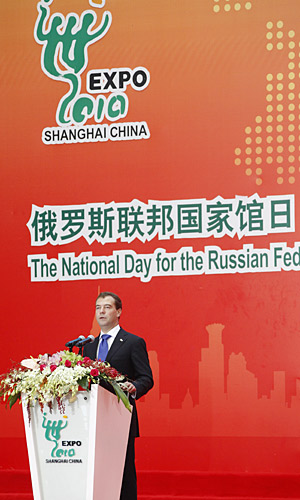|
 |
|
A RUSSIAN DAY: Russian President Dmitry Medvedev delivers a speech during Russia's National Pavilion Day at the 2010 World Expo in Shanghai on September 28 (PEI XIN) |
Xing said Medvedev's visit greatly promoted bilateral political relations and encouraged economic, technological and cultural cooperation. "The completion of the crude oil pipeline, especially, has pushed forward development of bilateral economic cooperation, both in quality and in quantity," Xing said.
Comprehensive cooperation
Energy cooperation is the most important type of economic cooperation for both sides. During Medvedev's visit, China and Russia celebrated the completion of a long-awaited China-Russia oil pipeline, the largest bilateral project between the two countries.
"The smooth completion of the pipeline project is a model for the two countries' mutually beneficial win-win cooperation and a milestone for China-Russia energy cooperation," Hu said at the completion ceremony.
The 999-km pipeline runs from Angarsk, in Russia, to Daqing, in northeast China. It is part of a bilateral loan-for-oil deal that was reached in 2009. According to the agreement, China will supply a $25-billion long-term loan to Russia, and Russia will supply China with 300 million tons of crude oil from 2011 until 2030.
Due to rapid social and economic development, China is now in urgent need of energy. It imports about 200 million tons of oil a year—half its annual oil demands. And 80 percent of the imported oil is from the Persian Gulf area.
Pirates near Somalia and the Strait of Malacca greatly threaten ocean transportation, said Ji Zhiye, Vice President of the China Institutes of Contemporary International Relations. Railway transportation from Russia to China's northeast is much safer. He explained that the two nations started energy cooperation long ago, but the high costs and slow speed of railway transportation caused a bottleneck. Besides, railway wagons and oil tankers will never meet soaring oil demands.
"The oil pipeline can solve all these problems," he said. Under the agreement, Russia will use the pipeline to transfer 15 million tons of crude oil to China annually, beginning on January 1, 2011. The oil should account for 7-8 percent of China's total crude oil import volume. "This means Sino-Russian energy cooperation is entering a new phase," said Ji. "And this is the basis of modern energy cooperation."
Analysts believe economic and trade cooperation, especially energy cooperation, will remain important to bilateral relations. Pan Dawei from the Shanghai Academy of Social Sciences explained that Russia has intensified modernization efforts in recent years, hoping to attract more foreign investment and advanced technologies. China should seize this opportunity and show its advantages in this field, so the two sides can benefit from cooperation, Pan said.
Jia, from Peking University, said Russia's sliding economy is generally recovering this year. Chinese Assistant Foreign Minister Cheng Guoping said at a press conference on September 20 that although the global financial crisis negatively influenced bilateral trade in 2009, bilateral trade volume is expected to bounce back to pre-crisis levels by 2010. From January to August, bilateral trade volume reached $35.3 billion, a 50-percent increase over the same period last year.
Medvedev's visit also aimed to cement his economic achievements by promoting bilateral economic and trade relations. To Russia, China is a huge market which can help ameliorate its economic condition. And to China, a deepened bilateral relationship can boost development, said Jia.
"Even though energy cooperation is an important part of China-Russia trade, it is, of course, not enough to constitute all of the two nations' trade," said Jiang Yi, a Russian affairs expert with the CASS, adding there is potential for cooperation between the two countries in areas like investment, technology, agriculture and finance.
The two sides agreed to expand their relationship with cross-border cooperation, hi-tech cooperation, investment, social and cultural cooperation and closer coordination under the frameworks of the Group of 20 and the SCO and as BRIC countries (Brazil, Russia, India and China).
"China and Russia will maintain international peace and stability, and promote the overall recovery and healthy and stable development of the world economy," Hu said.
Regional cooperation and security cooperation are also important to the two nations. According to the joint statement on deepening the bilateral partnership, China and Russia pledged to promote a "new security concept" on the basis of mutual trust, mutual benefits, equality and cooperation. The statement says both sides are committed to an open, transparent and equal framework for security and cooperation in the region, based on international laws and non-alignment principles, and taking into account all sides' legitimate rights and interests. It emphasizes the importance of cooperation, avoiding confrontation and never targeting a third country.
The joint statement also promises mutual support for each other's core interests, including national sovereignty, unity and territorial integrity. Russia reiterates in the statement its support for China's defense of its national unity and territorial integrity, saying it firmly supports China's stance and principles on issues related to Taiwan, Tibet and Xinjiang. China expresses its support for Russia's efforts to safeguard its core interests and promote peace and stability in the Caucasus and the Commonwealth of Independent States.
The two sides also signed an agreement on the fight against terrorism, separatism and extremism. Xing Guangcheng from the CASS said instability in the Asia-Pacific region will negatively affect both China and Russia. Therefore, regional security cooperation has become important for bilateral cooperation. | 